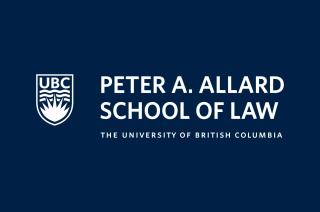Borders are unique legal spaces. Not only do they mark the intersection between different legal systems, they are also crisscrossed by several fields of law – immigration law, refugee law, constitutional law, and privacy law, among others – at both the domestic and international level. Borders are sites where questions of human rights are critically at stake, particularly with respect to detention and deportation.
For these reasons, understanding precisely how borders operate as places of law is crucial. This is as true of the Canada-US border as it for others, yet this border remains oddly under-examined. This gap was one of the motivations behind a new multi-year research project launched by Allard School of Law Professors Benjamin Goold, Efrat Arbel and Catherine Dauvergne and funded by a SSHRC Insight Grant.
“I come to this belatedly,” Professor Goold notes. “Borders are not something that I examined in the past. In conversations with Professor Arbel I became aware that lawyers rarely conduct border studies, in contrast to sociologists and criminologists. Borders are very much legal constructs and we expected that there would be much more legal scholarship around Canadian-US border.”
Professors Goold, Arbel and Dauvergne’s interest was heightened when, in the course of their initial research, they examined the Beyond the Borders Agreement, a comprehensive bilateral agreement between Canada and the United States that regulates almost every aspect of border governance. Although the 2011 joint Canada-US declaration launching the Beyond the Borders initiative specifically referred to the importance respecting the constitutional and legal frameworks that protect civil liberties and human rights in both countries, none of the official evaluation reports in the five years since make any reference to human rights.
“The fact that human rights are barely mentioned in the Beyond the Borders initiative and its evaluations is a cause for concern on a number of fronts”, noted Professor Arbel. “What does this mean for the treatment of migrants and refugees, whose legal rights are tenuous and poorly defined along the border? Will framing the border solely in terms of security, travel, and trade – and not human rights and civil liberties – irrevocably change how we approach and understand the border? These are the kinds of questions we hope to examine as we embark on this research”.
Professors Goold, Arbel and Dauvergne’s research will provide a comprehensive, independent evaluation of the human rights impacts of Beyond the Borders. Because the current border agreement will ultimately expire and be replaced by another, it is a timely opportunity to produce research critical to the development of future border plans.
More broadly, the project combines three areas of focus along the lines of each researcher’s field of expertise. Professor Arbel is no stranger to studying borders, including the Canada-US border. She has been researching various aspects of border regulation for several years, focusing on the legal and constitutional rights of refugees along the Canada-US border. This project will combine her expertise in border law, refugee law, and constitutional law, with Professor Goold’s work in human rights, criminology, surveillance and privacy, and Professor Dauvergne’s expertise in migration, refugee law, and constitutional and rights work.
Professor Goold comes to the project as someone whose interests are human rights in the context of security and privacy rights. He is particularly interested in the important implications of the Beyond the Border initiative for the rights of the individual in practice and the role played by the organizational culture of border services, the police and other law enforcement agencies. “There is a huge gap between laws as they appear on the books and as they are implemented on the ground”, Professor Goold explains. “Government actors who work along the border have considerable discretion that is not open to scrutiny or is particularly transparent. Canadian Border Service Agents are a great example – they exercise an enormous amount of authority and their decisions can have quite a significant impact on people’s lives, but we often know very little about how decisions are made. There is great need for systematic scrutiny of those decisions,” Professor Goold explains.
Part of the project will examine how that discretionary decision-making process works, and what its implications are for vulnerable groups. The research team will develop two detailed case studies of border law and governance in practice, focusing on immigration detention and deportation – two paradigmatic examples of border enforcement. Professor Dauvergne’s work has examined both immigration detention and deportation for many years.
“Over the years that I have been working in this field, all aspects of migration and refugee law have become more heavy-handed, more draconian. This study will offer a detailed account of how these changes operate, literally, in our own backyard,” says Professor Dauvergne.
In addition to the scholarly research, this project will gather information through fact-finding investigations along the Canada-US border. “We hope to interview different governmental and non governmental actors who work along the border, to develop a more accurate and nuanced understanding of the day-to-day operations of the Canada-US border. This is essential for understanding the border as a site of law”, Professor Arbel adds.
The project will eventually lead to a scholarly monograph and a series of articles. It will also produce material for government and non-governmental organizations tasked with enforcing and defending human rights along the Canada-US border. “Our goal is to provide a roadmap of how we might think about human rights and civil liberties along the border better in the future. We hope to engage with a wide range of stakeholders at various points as this project unfolds, with the goal of producing accessible informed reports that will affect government policy and practice,” Professor Goold concludes.
Professors Goold, Arbel, and Dauvergne are seeking applicants for a fully funded PhD position to work on this project.
ABOUT THE AUTHORS
Assistant Professor Efrat Arbel researches and publishes in constitutional law, refugee law, and prison law. Prior to joining the Allard School of Law, she completed her doctorate at Harvard Law School, and held a postdoctoral fellowship at UBC, during which she was also a visitor at the Oxford Centre for Criminology and the European University Institute. Combining her academic work with legal practice, Dr. Arbel is also engaged in advocacy and litigation involving refugee and prisoner rights, and has consulted with stakeholders on various aspects of border governance, including immigration detention.
Professor Catherine Dauvergne, Trudeau Fellow and the Dean of the Allard School of Law, has been working in the area of refugee, immigration, and citizenship law for twenty years. She has written three books that take a broad perspective on the theoretical underpinnings of these areas of law, including considering how human rights principles and discourses fit into a migration and citizenship framework. Her research is grounded in a belief that how we define and police the boundaries of our societies determines the terrain of our political engagements and says much about our national identity.
Professor Benjamin Goold joined the Allard School of Law in 2010. From 2003 to 2009 he was a Lecturer at the University of Oxford Faculty of Law and a Fellow in Law at Somerville College, where he taught criminal law, criminology, and torts. His major research interests include privacy rights, the use of surveillance technologies by the police and intelligence communities, and the rhetoric and language of human rights. He is the author of numerous works on privacy, surveillance, and security.



